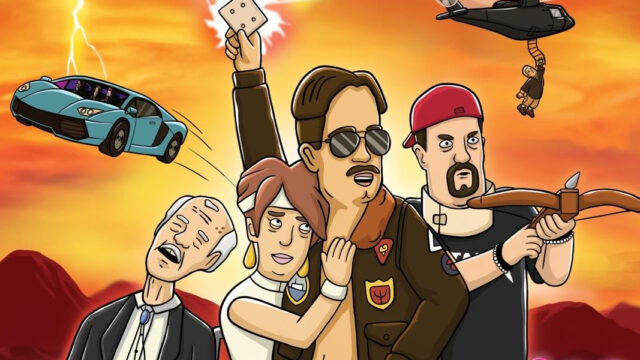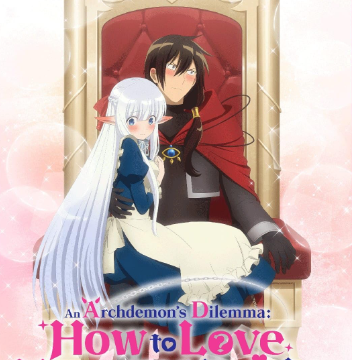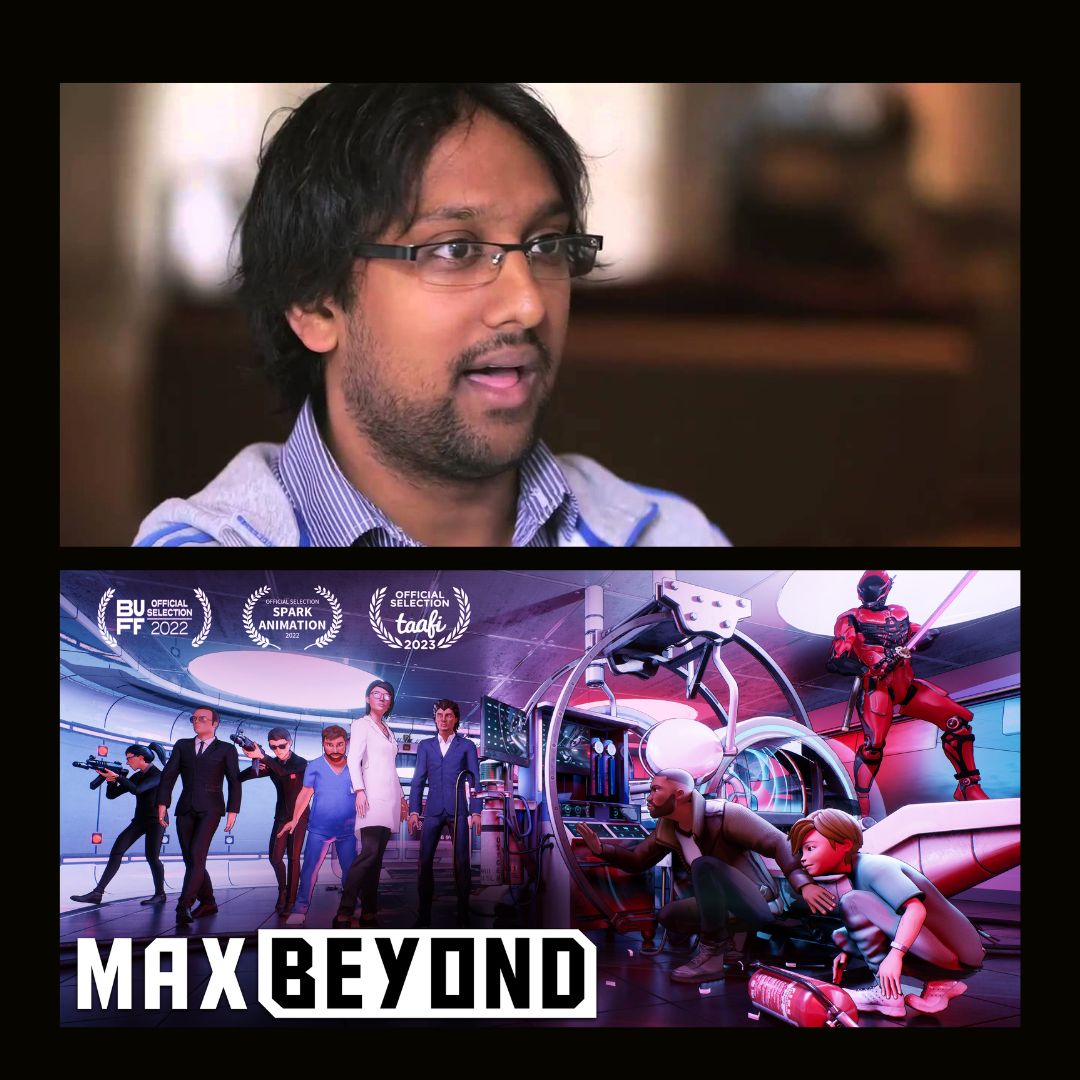English Dub Review: Mr. Tonegawa: Middle Management Blues “Final Destination”
Yukio Tonegawa won’t sing, but he’ll definitely dance.
Overview
The final episode of the season provides a slightly modified version of Tonegawa’s first pair of efforts. In the first episode, he is summoned—once again—to the office of President Hyodo. The president has become bored of all entertainment and demands something much darker. Tonegawa sighs, as he thinks that it’s going to be another long weekend at the office, but Hyodo has a surprise. He’s thought of his own death game.
The president has constructed the Human Derby, of Kaiji fame, but we never get to see it. Instead, we watch Yamazaki on his day off, experiencing a benign mimesis of the Human Derby throughout his day. He shocks himself on a joke pen in a toy store, and he falls off of his gym’s rock climbing wall. He texts the Team Tonegawa group chat, but his phone dies before he can discover the Human Derby’s dastardly details.
In the B-Story, Ogino is getting married. Tonegawa and his team are all in attendance. Additionally, the three transferred employees from earlier in the season return, suntanned and freshly bitten from sea snakes. The wedding mostly goes off without a hitch. Tonegawa’s speech is a huge hit, though it’s revealed that he doesn’t mean any of it, and the group finds out that Ogino used to be a standup comedian. Everyone seems to be having a great time until the final moments of the reception.
Tonegawa’s team begins a flash mob. Yukio’s sympathetic embarrassment shoots through the roof, but Ogino joins in. Tonegawa is happy for them, and it appears that he’s going to turn to leave when he rushes the dancing group and takes his place among them as the credits roll.
Our Take
I find it commendable that Mr. Tonegawa was able to make me feel anything at all when the vice-president of a loan-sharking company joined his co-workers in a synchronized dance circle but it did. Mr. Tonegawa has never been short on likable characters. In fact, there are very few characters not named Otsuki that I dislike. Mr. Tonegawa’s problem has always been knowing what to do with them.
The show is consistently unfocused. From its initial missteps not developing a single character for nearly six episodes to its baffling midseason addition of an entire second plot, Mr. Tonegawa does not seem to know when it has your attention. I’ve spent the past six months being alternately hopeful and disappointed in the series, even as I tried to accept it on its own terms, but with this finale, they made it clear that they had no clue what they were up to.
“Final Destination” isn’t going to show me any of the action from Kaiji. That’s fine. It’s even kind of funny that they showed me Yamazaki’s day off instead, but the continued insistence that they “couldn’t” show me the Human Derby wore pretty thin by the first callback. The show spent endless time in meetings for the Death Games, but apparently, the Human Derby was accomplished by a separate team entirely off-screen. I understand that the work of Team Tonegawa was never the point of the show, but making it entirely irrelevant at the eleventh hour felt pretty rotten.
The second half of the episode was, ostensibly, a nice bow on a wacky series, but it only serves to emphasize the show’s failures. Mr. Tonegawa intends to give each character a nice little sendoff by reminding us of their major character trait (Yamazaki’s photography) or by wrapping up their storyline (the freshly tanned exiles), but it seems to have forgotten many of its own most exciting developments.
What happened to the Hyodo double just chilling in storage? Will Saemon and Saeko ever get together? This is a show that dedicated multiple episodes of its punishingly long twenty-four episode run to eating challenges, but is saving any intrigue it has left in it for season two? This is less of a slow burn and more of a thawing. Mr. Tonegawa’s characters hover somewhere between Loony Tunes and actual characters. They’re too bound by the laws of reality to be the former but far too devoid of actual personality to be the latter.
This ultimately extends to Mr. Tonegawa himself. I held out hope for a moment, around midseason, that Mr. Tonegawa would be a satirical figure, intended to show modern Japan’s aging middle-aged population as they are forced to care for the enormous geriatric generation before them and adapt to the relatively sexless, net-savvy one after them. At his best, this is what Tonegawa can do. He’s web-savvy enough to know what a flash mob is (no way that Hyodo does), but he’s old enough to school Yamazaki on the art of the toast. Just as he was picking up steam as this character, though, his time was effectively cut in half for a half-baked parable about small business.
Yukio Tonegawa is a tragic figure. He sacrificed his entire personal life (sans his golf hobby) for a career that he doesn’t really like, and we never see why. He’s a martyr, but for no cause. He’s serious, but we never see who would mock him for his frivolity. His status as an avatar for Japanese society seems to come at the cost of his individuality. He could be any man, and therefore he is none. I also struggle to make sense of the fact that we know that he will someday be (literally) burned for his loyalty to Teiai.
I really like a lot of the things that Mr. Tonegawa is. It can be dark, incisive, funny, and even charming, but it tries to be as many of them as often as possible, and each additional thing weakens the others rather than strengthening them. The show became much more than a weird spinoff of a popular 90’s action anime. It has its own offbeat sense of reality, and there really is value in some of what it tried to do. However, the framework of its predecessor—while exactly what got the show greenlit—seemed to be an albatross around the show’s neck, holding it back from what it wanted to be and setting up some unrealistic expectations.
Tonegawa’s catchphrase “Your money is heavier than your life” seems to be a play on the 90’s Japanese saying “You lose your cash, you lose your neck,” something often uttered by those aware of the Yakuza’s hand in the Japanese financial crash of the 1990s. The slogan is oft repeated but never seems to amount to anything in the series. It seems like it always applied more to Kaiji. It wouldn’t have solved all of Mr. Tonegawa’s problems, but coming up with a catchphrase for their titular character that actually fit the tone of the show he was in would have likely gone a long way towards nailing down the show’s identity. Instead, we’re left with loan-sharks in flash mobs.



























Hi Ashley, thank you so much for reading and we love the feedback. Note that on that day we had 14th posts go up and only ten posts show on the front page, so it's possible the preview had already been archived by the time you got to it. One recommendation would be to add our RSS feed to your favorite news aggregator service like Feedly, this way you get all of the latest posts!